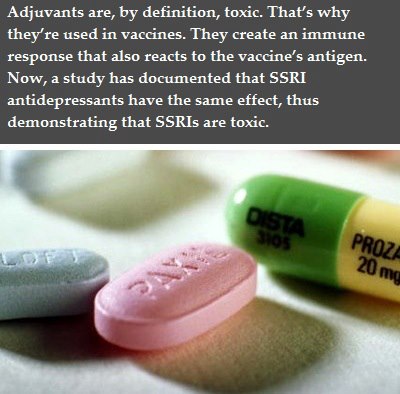
New Study: Antidepressants as Vaccine Adjuvants?
by Heidi Stevenson
February 16, 2013 http://gaia-health.com
Adjuvants are, by definition, toxic. That’s why they’re
used in vaccines. They create an immune response that also reacts to the
vaccine’s antigen. Now, a study has documented that SSRI antidepressants have
the same effect, thus demonstrating that SSRIs are toxic.
The typical approach to vaccines assumes that
they work on everyone in the same manner. That is, of course, the only way mass
vaccine programs can be justified. The reality, though, is that just as people
are individuals, they react to vaccines as individuals. Now, a study shows that
people who are depressed don’t respond as well to the shingles vaccine.
There’s a bit of humor in this. What this study unintentionally documents is
that it’s the health status of a person that determines whether someone will
become ill or how ill a person will become. That’s what those in the alternative
medicine world have been saying all along!
Shingles is a second go-round of chicken pox. The virus hides in the nervous
system and, usually during times of stress, it moves out along the nerve root
where it’s been lodged, creating a rash and usually significant pain in the area
served by that nerve system. Most people who suffer such an outbreak never
succumb again—and most people never fall victim to shingles.
Interestingly, the authors did find that it’s not alleviation of depression that
factors into the efficacy of the shingles vaccines. It made no difference
whether the antidepressant had any benefit in the depressed person. The
antidepressant drugs themselves are acting as a vaccine adjuvant. That should
tell us something significant about these drugs:
Adjuvants are, by definition, toxic. It’s their toxicity that increases a
vaccine’s efficacy. Therefore, the lesson that needs to be taken from this study
is that antidepressants are, by definition, highly toxic.
The Shingles Vaccine
There’s a significant difference between the shingles and chicken pox vaccines.
Like virtually all others, the chicken pox vaccine causes the body to create
antibodies to the chicken pox virus. Thie antibody protection is referred to as
the humoral system. Antibodies are the memory of previous infections. They
remain aware of a characteristic of of the invading infectious agent and trigger
the immune system to destroy any duplicate invaders that are cheeky enough to
have a go.
The other type of immune system protection is called cell-mediated. It’s
illustrated in the brief video to the right.
Cell-mediated immunity involves killer T-cells, which recognize many invaders
without seeing them first. When they recognize invaders, they do as their name
indicates, kills them. Next, they activate other killer T-cells and macrophages
to join the battle. Then, they stimulate cells to to secrete cytokines, which
further help battle the invaders. The cell-mediated immune response exists
without previously being triggered by an infection.
The shingles vaccine is unique because it triggers the cell-mediated immune
response.
The Study
The study, published in the journal, Clinical Infectious Diseases, used 40
subjects diagnosed with major depressive disorder who were given SSRI
antidepresants. They were matched with 52 age and sex matched controls who had
never received mental illness or depression diagnoses. The trial was double-blnded.
Their varicella zoster virus cell-mediated immunity (VZV-CMI) levels were
measured before being vaccinated, and again at 6 weeks, 1 year, and 2 years
after vaccination.
Subjects diagnosed with depression and not treated with antidepressants were
found to have lower levels of VZV-CMI than the nondepressed controls. Those who
were treated with antidepressants had higher levels of VZV-CMI than those who
took antidepressants. It made no difference whether the drugs had any effect on
their subjective levels of depression.
The study’s conclusion was that treating depressed people with antidepressants
probably improves the efficacy of the shingles vaccine. They seem to imply that
artificially improving someone’s mood is beneficial, but that is not what they
demonstrated.
What they showed is that giving an SSRI drug improves the cell-mediated immune
response to the shingles virus. Their results showed that it made no difference
whether the patients’ mood was helped. Therefore, they did not demonstrate that
an improvement in a depressive state does one bit of good in increasing the
vaccine’s results.
Instead, what they demonstrated was that a chemical change in the body, which
may have nothing to do with mood, has a toxic effect like an adjuvant. Since
adjuvants are, by definition, toxic agents that increase the effectiveness of
vaccines, then they’ve actually demonstrated that antidepressants are toxic.
The question is, what do they plan to do with this information? They’re already
talking about using antidepressants to boost the effectiveness of other
vaccines. Are they going to start giving people antidepressant before
vaccinations?
Frankly, I would put nothing past the vaccinators—especially when they’re the
same corporations that sell antidepressants. Since the sales of antidepressants
would soar, you can expect to see these highly toxic, brain damaging drugs
prescribed to more and more people. They’ll tell people it’s for their health …
but the real reason has nothing to do with health. It’s about profits. Of
course.
Sources:
Varicella Zoster Virus–Specific Immune Responses to a Herpes Zoster Vaccine in
Elderly Recipients With Major Depression and the Impact of Antidepressant
Medications
Depression May Lower Response to Shingles Vax
Treating Depression May Boost Vaccine Response
Study Suggests Link Between Untreated Depression and Response to Shingles
Vaccine
http://gaia-health.com/
